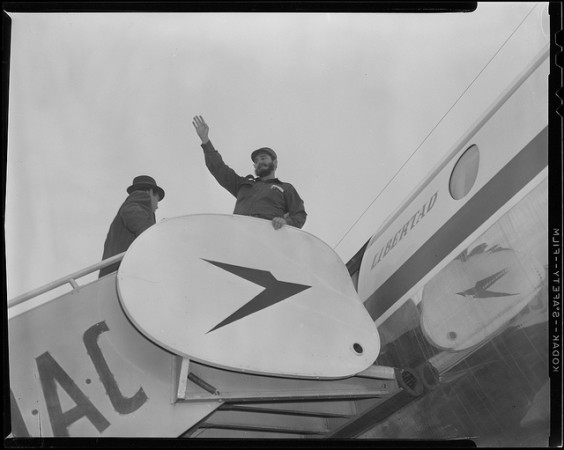Helicopters of History: 1980s Literary Flights with Fidel Castro
by Orlando Luis Pardo Lazo and translated by Alex Higson. / August 29, 2014 / 1 Comment
On two exiled writers and their shared literary vision of Cuba.

Photo via Flickr user Boston Public Library
Literature written in exile is always more mysterious than literature written from within the homeland. Exiles write from a multifaceted state of isolation: they are removed from their homeland, from their own language, and from other exiles. This gives rise to a literature of empty spaces. The works, filled with a rather laughable sense of nostalgia, create unexpected bridges between what each exile experiences in his or her solitude.

- Is it worth-while to focus on the last images and letters coming from the inside of the last living utopia on Earth? Is Cuba by now a contemporary country or just another old-fashioned delusion in the middle of Nowhere-America? A Cold-War Northtalgia maybe? Can we expect a young Rewwwolution.cu within that Ancien Régime still known as The Revolution? I would like to provoke more questions than answers.

- Orlando Luis Pardo Lazo was born in Havana City and still resides and resists there, working as a free-lance writer, photographer and blogger. He is the author of Boring Home (2009) and is the editor of the independent opinion and literary e-zine Voces.
In this sense, Fidel Castro’s Revolution contributed generously to literature of exile. From its advent in 1959, Cuba began to censor its writers and throw them out of the country. The state took over the press and the media at will. In the worst soviet fashion, a form of socialist realism was put in place. As a result, a mass exodus began immediately. Today, in 2014, the number of exiles is still swelling as Cubans continue to escape from the nation once known as the Island of Freedom.
In the 1980s, two of these writers on the run came upon the same unlikely vision: to look over their lost country from the air, and personalize it in the character of the “Premier,” Fidel Castro. In El color del verano (The Color of Summer) and En mi jardín pastan los héroes (Heroes Are Grazing in My Garden) the novelists Reinaldo Arenas (1943–1990) and Heberto Padilla (1932–2000) create a fictional sparring of words with the Commander-in-Chief who drove them from their homeland. Both writers invent an outing with Fidel Castro to describe the reality of the conditions on the military-controlled island. This presented a paradox to the international Left’s portrayal of Cuba as a proletarian paradise par excellence.
Neither of the novels were published in Cuba, of course. However, thanks to an underground trade in banned books, the works are quite well known among free readers living inside Cuba’s barbed-wire fences.
In Arenas’ “colorful summer,” we see the definition of nerve. He offers a bird’s-eye view of the island from a military helicopter where Fidel watches over his domain through binoculars. Fidel issues whimsical orders to his ministers while executing them one by one, from coast to coast, for being as useless as they are disloyal to the puppet master’s absolute will. The Castro of this aerial nightmare is a monster of monologue, an insensible assassin soaring over a revolution in tatters. The author uses his personal vengeance to create a sarcastic caricature, Fidel as a coarse ogre.
Padilla’s work embodies the pathetic Oedipus complex that our intellectuals are suffering under the Revolution. The protagonist is written as a zoocialist zombie engaging in a dialogue with Fidel in the same way that Adam did with God. In doing so, he seeks forgiveness – he has committed no crime, but in this Kafkaesque Cuba guilt is presumed – as well as instructions on how to avoid becoming an intellectual critic of the regime. In this Eden of beautiful flower groves, replete with successful First World farming and cattle ranching, beneath the earthly paradise of a trustworthy and happy ceiba tree, Castro scolds the author for having doubted Him, for not blindly believing in His authority. Once again, they end up peering through binoculars from a helicopter flying from one end of the country to the other.
Each novel presents a floating Fidel as a symbol for all Cubas.
Both Arenas and Padilla were imprisoned on the island in the 1970s, and both died in exile, unable to return to the land of their birth. Despite this, or indeed perhaps because of it, the literature of both writers always overflowed with Cuban-ness in every single paragraph. Arenas writes from the fury and pageantry of a fallow terrain, an ethical wasteland. Padilla writes as an exercise in moral memory that aspires to understand and commit itself to the labyrinths of history. Both are antithetical and hyper-political, electrons straying from the orbit of an Apollo that beats his children, or perhaps a black hole named Fidel.
Castro, today an octogenarian, has enjoyed a life twice as long as either Arenas or Padilla. In the convergent scenes of their imaginations, which carried them up in a literary helicopter, both confronted the Cuban source of all powers. Ultimately, these two novels were their perverse tributes to the omniscient narrator of a revolutionary age that has no end date.
I’m not sure what will happen to the imagination of Cuban writers, both on the island and in exile, now that Fidel is only able look down on them from his wheelchair.





One Comment on "Helicopters of History: 1980s Literary Flights with Fidel Castro"
Dear OLPL, it’s my wish and well intentioned hope, that the day will come, when you are able to exorcised that FC out of your system.
…”now that he is only able to look down at them from his wheelchair.” Please, enough!